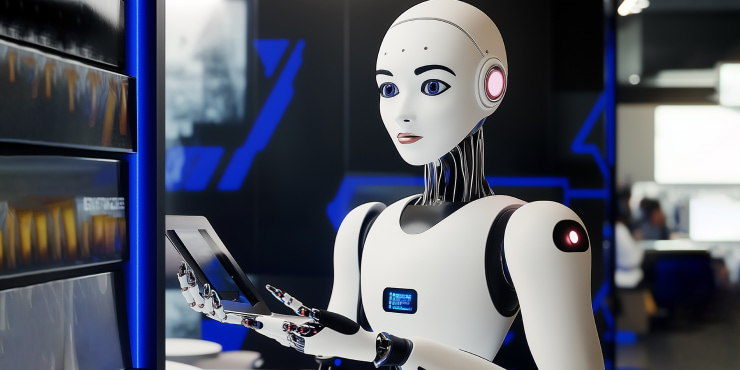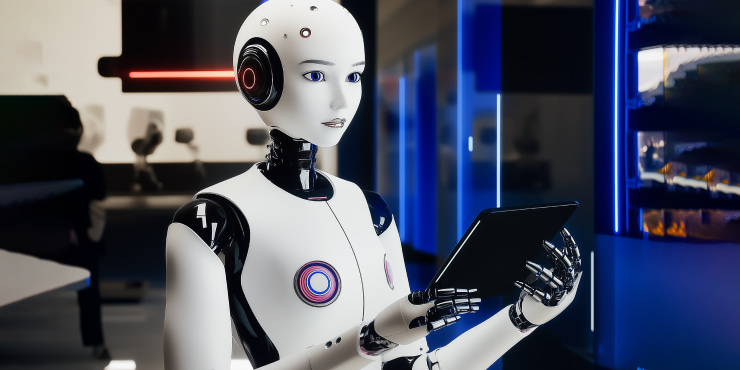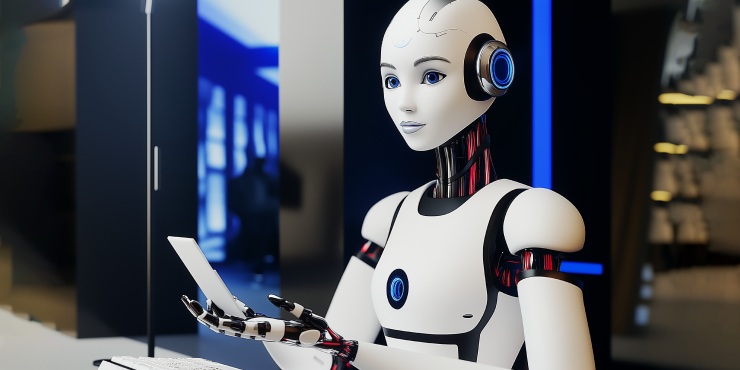Host AI: Revolutionizing Restaurant Service with AI-Powered Hosts

The restaurant industry, a dynamic blend of culinary artistry and customer service, is undergoing a profound transformation driven by AI. At the forefront of this revolution, AI-powered hosts are poised to redefine the dining experience.
As restaurants grapple with fluctuating customer demands, staffing challenges, and the need to deliver personalized service, AI hosts have emerged as a compelling solution. These intelligent systems, powered by advanced algorithms and machine learning, promise to streamline operations, enhance customer satisfaction, and optimize resource allocation.
The need for such innovation is increasingly evident in today's fast-paced dining environment, where efficiency and personalization are paramount. From automated reservations and table management to personalized greetings and recommendations, AI hosts offer a suite of benefits including increased operational efficiency, enhanced customer personalization, and significant cost savings.
In this article, we will explore the transformative potential of AI hosts and examine their role in shaping the future of restaurant service.
How AI is Transforming Restaurant Hosting
Traditional hosting involved manually writing down names and managing waiting lists, but technology has now transformed this process. AI hosting systems manage online reservations, allowing customers to select their preferred dining times. They also analyze restaurant layouts to optimize seating arrangements and reduce wait times. They can even interact with guests, answering questions about menu items and specials. Some restaurants use robots or screens to show you to your seat.
AI capabilities extend across multiple functions, from processing reservations through websites and apps to analyzing seating arrangements for optimal guest placement. These systems can provide menu information, highlight daily specials, and in some establishments, even process customer orders.
As for restaurants, some use tablets to let you order and pay. Others have robots that bring food. You can even talk to a screen to ask questions. These things make eating out quicker and sometimes more fun.
AI Hosts vs. Human Hosts: A Comparative Analysis
AI systems process information quickly, handle multiple guests simultaneously, and operate without fatigue. AI can analyze data to determine optimal seating arrangements, but it lacks the emotional intelligence and empathy that human hosts naturally possess.
Rather than replacing human workers, AI technology is designed to augment staff capabilities, handling routine tasks so employees can focus on enhancing guest satisfaction through meaningful interactions.
Usually, when lots of people come at once, AI can keep things organized. It can tell people how long they will wait and keep the line moving.
Customer Experience with AI Hosts
Customers appreciate reduced wait times, and, locally, AI hosts streamline the check-in process for a faster, more efficient dining experience. It can also remember what you like, so you get food you enjoy.
AI can look at what you ate before and suggest new things. It can also tell you about special deals or events.
Some customers worry about the impersonal nature of AI systems and their inability to understand human emotions. But restaurants are working on making AI feel more like a person. They also still have people to talk to if you need help. AI is there to make things easier, not to take away the human touch.
Implementing AI Hosts in Restaurants: What You Need to Know

Putting artificial intelligence AI hosts into a restaurant isn't as hard as it might sound. However, implementation requires careful planning, beginning with clearly defining the specific functions you want your AI host to perform. Do you want it to handle just reservations or also help people find their tables? Once you know what you need, you can start looking at different AI systems.
Setting up the technology involves a few steps. You'll need the right software, which might be a program you buy or a service you pay for each month. You'll also need the right hardware, like tablets or screens, to show info to customers. And, of course, you'll need a good internet connection to work smoothly.
Restaurant owners should consider several cost factors when considering how to host your own AI model. Initial expenses include software licensing, hardware purchases, and potentially professional installation and configuration services. You might also need to train your staff on how to use the new system. While AI systems require a significant initial investment, they often yield long-term cost savings through increased operational efficiency.
Several companies now offer specialized artificial intelligence AI host software for restaurants. Some focus on taking reservations online. Others offer comprehensive systems that manage seating, handle customer interactions, and provide real-time feedback to kitchen staff. Evaluating multiple solutions is advisable to determine which system best aligns with your operational requirements and financial constraints.
When selecting an AI hosting platform, prioritize user-friendly interfaces that facilitate quick adoption by your staff. You want something that your staff can learn quickly. Also, consider how well it integrates with your existing systems, like your point-of-sale system. Good AI systems should make your life easier, not harder. Finally, make sure the system has good customer support. If something goes wrong, you want to know you can get help quickly.
Challenges and Limitations of AI-Powered Hosting
The implementation of AI-powered hosting is promising. However, this technology comes with significant challenges and limitations that require careful consideration and planning across technical, financial, and operational areas.
Technically, the AI solutions for restaurant host/hostess require robust infrastructure and seamless interoperability with management software. Algorithmic bias remains a serious concern in AI systems and could potentially lead to discriminatory seating arrangements or preferential treatment that undermines fair service principles.
Furthermore, system malfunctions, network outages, and technical glitches can disrupt operations, resulting in customer dissatisfaction and inefficiencies. The financial implications are substantial, requiring significant capital investment in:
- Hardware
- Software licensing
- Ongoing maintenance
While the potential return on investment is substantial, it may not materialize immediately, posing a challenge for establishments with limited resources.
Operational hurdles include the need for staff training to effectively utilize and manage host AI systems. Resistance to change among employees, coupled with concerns about job displacement, can impede the smooth transition to AI operations. The need for constant software updates and system maintenance requires dedicated technical support, adding another layer of operational complexity.
Customer skepticism and acceptance represent a significant sociological challenge. Many patrons harbor reservations regarding the efficacy and empathy of AI hosts. The lack of human warmth and personalized interaction can detract from the dining experience. This is particularly true in fine dining establishments where personalized service is paramount. Addressing these concerns requires educating customers about AI benefits while emphasizing the continued presence and value of human staff.
Over-reliance on AI solutions for restaurant host/hostess can create a sterile, impersonal atmosphere, while underutilizing this technology results in operational inefficiencies and missed opportunities to enhance customer service. The key lies in leveraging AI to augment, not supplant, human interaction. AI should handle routine tasks like reservations and table management, freeing human hosts to focus on providing personalized service and addressing complex customer needs. The cultivation of a synergistic relationship between AI and human staff is paramount. It’s vital for achieving optimal client satisfaction and operational efficiency.
The Future of AI Hosts in the Restaurant Industry

AI hosting systems represent just the beginning of technological transformation in the restaurant industry. Future advancements will introduce increasingly sophisticated systems capable of emotional recognition and preference learning through natural conversation, fundamentally transforming the customer experience. These systems will become more conversational, offering personalized menu suggestions and accommodating dietary restrictions.
AI hosting systems will become increasingly common across all restaurant segments, not just in upscale establishments. Even small cafes and family restaurants will adopt AI solutions to improve efficiency and service quality, potentially incorporating robotic food delivery and visual menu interpretation technology to assist with ordering.
Imagine arriving at a restaurant to find your table ready and your favorite drink already prepared — without having to ask. AI can make these things happen. These technologies enhance operational efficiency, creating a more enjoyable experience for both guests and staff.
But it's not just about making things easier. It's also about making them more personal. AI can track customer preferences, remembering your favorite table and suggesting new dishes based on your taste profile. It can make you feel like a regular, even if it's your first time there.
In the future, eating out will be a mix of smart tech and human kindness. Artificial intelligence AI hosts will take care of the simple things. This allows restaurant staff to focus on creating a welcoming atmosphere for guests. It's about using technology to make the whole experience better, from the moment you walk in the door to the moment you leave.


